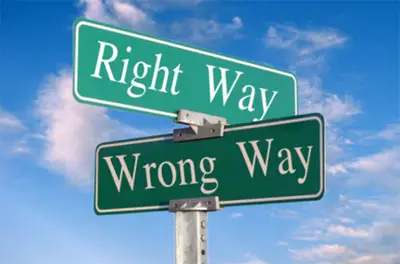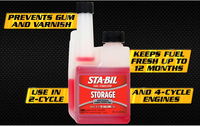Using E10 (and E15) in Your Boat - A Lesson Learned
 |
By Marc J. Rauch
Exec. Vice President/Co-Publisher
THE AUTO CHANNEL
 Marc J. Rauch |
Back in May 2018, Paul Driessen wrote an anti-ethanol editorial for the Foundation for Economic Education website titled "Ethanol Is a Never-Ending Gravy Train for Corn Farmers and Ethanol Producers. But What About the Rest of America?" Paul is listed as a senior fellow with the Committee For A Constructive Tomorrow and Center for the Defense of Free Enterprise. He is also the author of "Green Power, Black Death" (Merril Press, 2010) and co-author of "Energy Keepers, Energy Killers" (Merril Press, 2008).
I only leaned about Paul's article very recently, on September 12th.
 Paul Driessen |
Paul makes many of the usual run-of-the-mill negative statements about ethanol, but the comment that really caught my attention was:
"Ethanol wreaks havoc on the engines and fuel systems of boats, motorcycles and lawn equipment, as well as many automobiles, which are not capable or allowed to run on E15. Repair and replacement costs are a major issue for marine and small engine owners (as I personally discovered when I owned a boat)."
The reason this comment caught my attention is because the people who normally write these ethanol-hating stories never have any personal experience with ethanol to refer to - they just take the fallacious information fed to them by the oil industry and spit the claims out under their name in order to collect whatever fee they can earn. This story was different; this story had the promise of first-hand knowledge!
So I wrote Paul Driessen an email shortly after reading the editorial:
Hi Paul -
I've read a few of your articles about ethanol and I'd say that all of the negative comments are a combination of lies and gross exaggerations.
But let's cut to the chase...what is it specifically that ethanol did to wreck your boat?
Yesterday morning I received a reply from Paul, he wrote:
Hi Marc...I had a inboard boat at the weekend home we used to own. We used them only once every few weeks, which meant the boat sat idle for long stretches along a pier. However, I filled its tank at the local marina – never imagining it was providing E10 gasoline, a fact that was not featured (at least not on the waterfront side). The boat ran fine that day, but not when I came back a few weeks later. Then it would not start or run.
I took the boat to our local repair shop, which cleaned things up, got the engine running again – and gave me a quart jar full of sample gasoline from the tank, with a comment that this is what happens when you use E10 gasoline and don’t include Stabil or some other stabilizer. The jar had about an inch of WATER floating on top of the gasoline. I ranted at the marina, to no avail. But lesson learned.
Thanks for asking. I've read your articles from time to time, and even linked to a couple of them in my columns. You do excellent work. Don’t ever stop!
This was a great reply from Paul because it validates so much of the arguments that I and other alt-fuel advocates make in support of ethanol. The following was my response to him:
Hi Paul -
Thank you for your reply and for your kind words, especially considering the tone of my comments to you in my initial email of September 12th.
I particularly appreciate the details of what happened with your boat. I agree with your assessment that it was a "lesson learned," but for reasons slightly different than you may think. And, I believe that you'll be surprised at how instructive your experience will be for so many other people from this point on.
The problem that you ran into is a common problem...caused by gasoline. It is not caused by ethanol. I'm going to jump back in time for a moment, and then return to explain what really happened to your boat....
You say your mechanic said, "...this is what happens when you use E10 gasoline and don't include Stabil or some other stabilizer."
 pic from Sta-Bil promotional video |
It would be fantastic if the original developers of Sta-Bil foresaw a time years into the future when ethanol would re-emerge1 as the perfect additive to gasoline to replace tetraethyl lead in order to stop engine knock and boost engine performance, and to claim that Sta-Bil will cure the problems that E10 will cause in the 21st century.
Alas, in searching through the Internet, I found no evidence that Sta-Bil's creators had any such prescient moment.
Back to present-time (or at least to the time when your mechanic gave you the bad news about your boat):
Your mechanic was probably correct in suggesting that you should have put Sta-Bil in your fuel, but he was wrong when he blamed the problem on E10. Ethanol burns clean. Ethanol is a solvent, it helps to clean out engines. Ethanol can be used to dissolve or remove varnish. This point is supported by Mercury Marine's testing. As you probably know, Mercury Marine is the largest manufacturer of marine engines in the world. Their position is that E10 is better for marine engines than E0 (ethanol-free gasoline) because it keeps the engines clean. A few years ago, Mercury did a live webinar in which they covered this issue. They also stated that virtually all other after-market products that claim to re-vitalize gasoline are just "snake oils." You can watch and hear this webinar at: http://dcd96xmek71bc.cloudfront.net/archives/email/Trade/BoatingIndustry/MythsofEthanol-August252011.mp4.
Ethanol, by the way has a very, very long self life. This is easily proven by just going to your own liquor cabinet in your home and checking out the oldest vodka, tequila, gin, rum, or whisky on your shelf. Without moving the bottle, observe the liquid, notice how there is no phase separation. Then open and smell the liquor, it'll smell exactly as it did when you first bought the bottle. And now, pour yourself a shot and taste it. It will taste just as good as it did when you first bought it (of course, if you don't like the taste of hard liquor it will taste as bad as it did, but it won't be "sour" from the time spent sitting on the shelf). The liquor will have exactly the same burning characteristics as when it was new. You can't do this with gasoline. Firstly, drinking gasoline will kill you; second, gasoline does go bad in a matter of weeks.
When your mechanic showed you the jar of E10 with an inch of water on top, he intimated another problem that is often wrongly blamed on ethanol: That it sucks water out of the air. This in fact does not happen. Yes, ethanol is hygroscopic, but hygroscopic substances do not suck water out of the air. I've written a rather long paper on this, which you can find at: http://www.theautochannel.com/news/2016/03/18/209988-ethanol-does-not-suck-water-out-air.html.
However, to save you some time, let me suggest that you don't read my paper (unless you really want to). Instead, just continue watching the Mercury Marine webinar because they address the issue of ethanol being hygroscopic. Mercury clearly states that ethanol has no ability to suck water out of the air.
Therefore, your mechanic was wrong on a second point about ethanol.
In fact, ethanol is the product you want to have in your fuel tank and system if water forms in the tank because of condensation, which is the common reason why water can appear in your tank. Ethanol will absorb a certain amount of water it comes in contact with (comes in contact with, not sucks water out of the thin air). But, of course, there's only so much water that ethanol can absorb...although it's still far more than the amount of water that gasoline can absorb. Mercury Marine's webinar offers a good tip on how to prevent too much condensation from happening while your boat is idle.
Ultimately, the experience you had proves another thing that I often write about: Just because someone is employed as an engine mechanic, it doesn't mean that he or she actually knows what he or she is talking about. They might be great at changing fan belts, gapping spark plugs, or installing a new battery; but this doesn't mean that they know anything about fuels and how an internal combustion engine really works.
There's two more points I'd like to make:
In your article for Foundation for Economic Education, you refer to ethanol wrecking engines and fuel systems other than those in boats. Obviously, the information I provided above pertains to non-marine engines as well. But, when people claim that ethanol damages engines and fuel systems they usually include conversation about how ethanol corrodes rubber, plastics, and metals. Ethanol, however, is far more compatible with materials likely to be found in internal combustion engines than gasoline and the aromatics that are used in place of ethanol (toluene, benzene, and Xylene). I can provide you with links to chemical compatibility websites if you'd like to look at them - let me know.
The second point is that while the Mercury Marine webinar supports the use of E10, they don't support the use of E15 or higher ethanol-gasoline blends in America. On the face of it, this looks bad for E15 use (which is the basis for your article for Foundation for Economic Education). Mercury Marine, like nearly all manufacturers of engines and vehicles, walks a fine line regarding warranties. They only warranty their products for the length of time mandated by the host country that they sell their products in.2 They do this for cost liability reasons, not because the products or the fuels have that time-determinate shelf life. Mercury Marine also sells their engines in Brazil, where the mandated basic engine fuel is E27. In Brazil, the engines are warranted to cover E27. These are the same engines sold in America. If the engines are safe to use with E27 in Brazil, they are safe to use in America with E15, E20, E25, and E27. Moreover, in the fairly near future Brazil will be upping their basic fuel mandate to E40. This means that Mercury Marine, Ford, General Motors, Volkswagen, and all the other manufacturers will have to extend their warranties for their products for use with E40.
I hope I've been able to properly respond to your comments and that the information provides you with enough facts to reconsider your position.
Best regards to you.
1. It was well known to scientists and engine designers in America before the invention of leaded gasoline that ethanol eliminated engine knock and provided more horse-power. This fact was "forgotten" by the huge expenditure by the oil industry to vilify ethanol. In Great Britain and other countries they always knew ethanol was the better solution to quiet engine knock and provide greater horse power. (SEE: The Hypocrisy of Big Oil and API
2. The one recent exception to the minimum mandated government warranties is Kia and Hyundai, who warranty their vehicles for 10 years. But this isn't done because their vehicles are better built, it was done as a marketing tactic to help sales. Kia and Hyundai are good vehicles, but they're not three times better built than Volvos or Mercedes or BMWs, etc.
I just received this email reply from Paul Driessen:
Marc – Thank you very much for this fascinating, detailed education. You really enlightened me, and I truly appreciate it. I will keep this email around for future reference, especially re gasoline for my portable generator, which we keep since Isabel for hurricane and other disaster/blackout events.
• SEE ALSO: Lauren Fix Takes Ethanol Opposition To A New Level Of Stupidity


